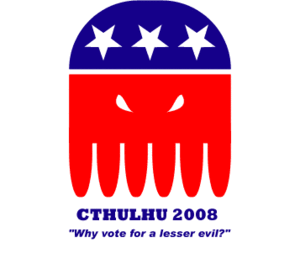Friday, October 17, 2008
Kleptocrats and pornocracy

The biggest argument against democracy is a five minute discussion with the average voter.Since I've been hit by the stone thrown by Eleonora in the previous post, I'm here going say what I think about voting right in Democracies.
W. Churchill
In a few occasions during the last couple of years, I found myself thinking that a very easy general-culture test taken by the voters just before expressing their vote, would have avoided irrational decisions.
Smart politicians are often good in move and manipulate stupid hordes of people by frightening them with populistic arguments. Sometimes people just vote against something or someone they fear without knowing what they're signing for.
So I use to think a couple of random and very basic questions (such as: "Who's the current President of this Country?" Think that the question "How many regions are there in this Country?" would have cut S. Berlusconi's vote out!) before the vote could be used to weight the political influence of every person.
Of course the matter is not an easy one.
We would like to be very careful in chosing the questions in order not to discriminate people from their wealth (rich people tend to be more cultured of course), race or sex.
Then that would become easily a strong weapon in the hands of the current politicians that will try to have a profit out of it so we'd need strong rules for that.
For example sometimes in the past, the right to vote has been limited to people who had achieved a certain level of education or passed a certain "literacy tests" in some states of the US.
In practice, the composition and application of these tests were frequently manipulated so as to functionally limit the electorate on the basis of other characteristics like wealth or race.
This tells me that a culture test would not work for what I said before: a poor woman of the south of Italy may don't care about litterature and economics but, if she shows interest, she still deserve the right to be represented in the parliament, doesn't she?
But it would be not easy to convince people to weight their vote.
To me the argumentation would be: when you go for a surgery you let discuss and decide all the procedure to the medical staff. In the same way it would be way better if poeple that knows something more about a specific subject had more decision-power.
But on the other hand this would be not a democracy anymore: democracy is giving the power to the folk that elects its representatives to deal with hard topics in their place.
If people are stupid on average (and they are), they will vote for inept politicians.
And they want to keep doing it.
Subscribe to:
Post Comments (Atom)






9 comments:
insomma: "son d'accordo con la democrazia ma la democrazia non sè d'accordo con mi"
son d'accordo.
e invece sè d'accordo (d'accordo sè la parola della serata (serata grappa de rosa cinese per altro)) che chthulu se pronuncia klulu??
mz
no, si pronuncia ktulu` e non c(i)tulu
(ma come cazzo te xe viniu` de ciamarlo citulu???)
cmq stasera alla fine non son sufficientemente ubriaco per scriver un dialogo, per cui aspettiamo tempi migliori (generalmente i tempi migliori stanno nella botte piccola)
(e google: fermo!!!!)
sto disco novo de capossela invece?
mz
non saprei...
forse dovremmo spender soldi per comprarlo originale, no?
e cmq sto cercando di convincere ele a versirsi da krampus per allouin
e ti de kurent?
comunque si, lo go ciot originale
.. e el primo impatto se stà
"bof forse dovevo scarigarlo prima per prova"
adesso invece sè subentrà la fase "go speso soldi e quindi anche se no se bel me piasi"
mz
certo...
cmq gli album di capossela a me fanno un po' tutti questa prima impressione
Cmq tornando all'argomento del post, secondo me bisogna distinguere tra persone acculturate e persone intelligenti. Una persona intelligente può anche non sapere quante regioni ci sono in Italia, o come fare a risolvere la crisi economica. Conscia di non saperlo, voterà la persona più adatta a risolvere tali problemi o ad avere tali nozioni. Invece una persona anche di cultura, ma scema o disonesta (tutt'altro che la stessa cosa) voterà in entrambi i casi la persona che ritiene meno adatta a realizzare questi compiti. La persona scema lo farà perché non ama sentirsi scema per cui voterà chi ritiene meno scemo di lei o cmq che non le faccia pesare di essere scema. La persona disonesta lo farà con l'idea che un paese mal governato in genere lascia più spazio alla "libera interpretazione" delle leggi...
quindi la soluzione e` chiedere: "ti ritieni una persona disonesta?"
cmq si`, il problema non e` di facile soluzione. E quello che dici tu era quello che cercavo di spiegare col mio inglese stentato: che bisogna stare attenti a non far l'associazione cultura=intelligenza o peggio cultura=interesse politico...
cmq per i referendum la cosa si semplificherebbe. Basta infatti fare un paio di domande (anche un po' piu` specifico) per vedere se chi vota e` effettivamente informato/interessato all'argomento referendario.
In ogni caso stiamo usando in modo scorretto il termine "cultura", confondendolo con "istruzione". Diciamo che trovare un modo veloce per testare la "cultura" di una persona sarebbe già un grande vantaggio per il sistema elettorale, cosa non vera per l'istruzione.
Post a Comment